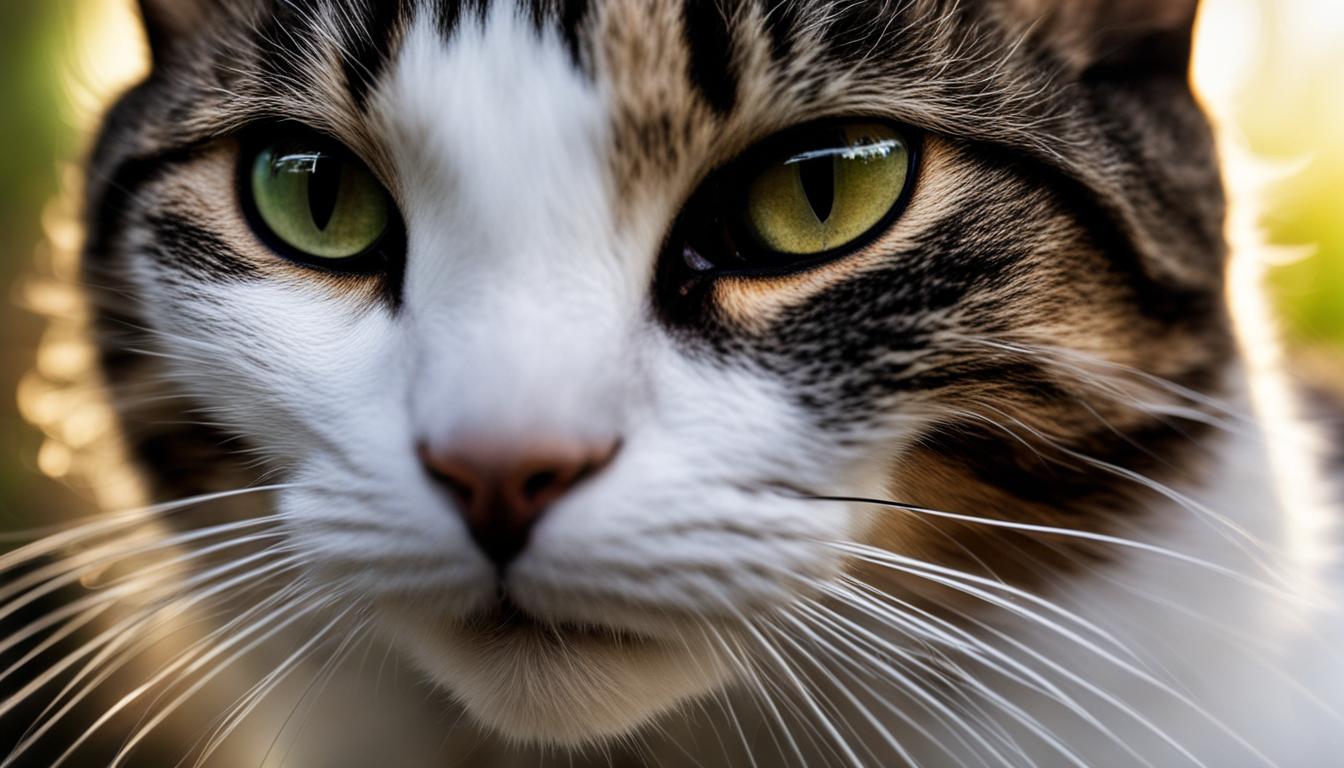Originally posted on November 18, 2023 @ 5:24 am
Have you ever found a cat whisker and wondered if it would bring you good luck? Many people believe that finding a cat whisker is a sign of good fortune, but is there any truth to this superstition? In this section, we will explore the meaning behind cat whiskers and discuss the superstitions associated with them.
Key Takeaways:
- The belief in finding a cat whisker as a symbol of good luck is a popular superstition.
- Cat whiskers have a significant role in feline anatomy and are essential for a cat’s navigation and sensory perception.
- The origins of this superstition can be traced back to ancient folklore and cultural traditions.
- Scientifically, cat whiskers are fascinating biological features with unique functions.
- Whether you believe in the luck associated with finding a cat whisker or not, they remain a captivating aspect of feline anatomy and human imagination.
The Significance of Cat Whiskers
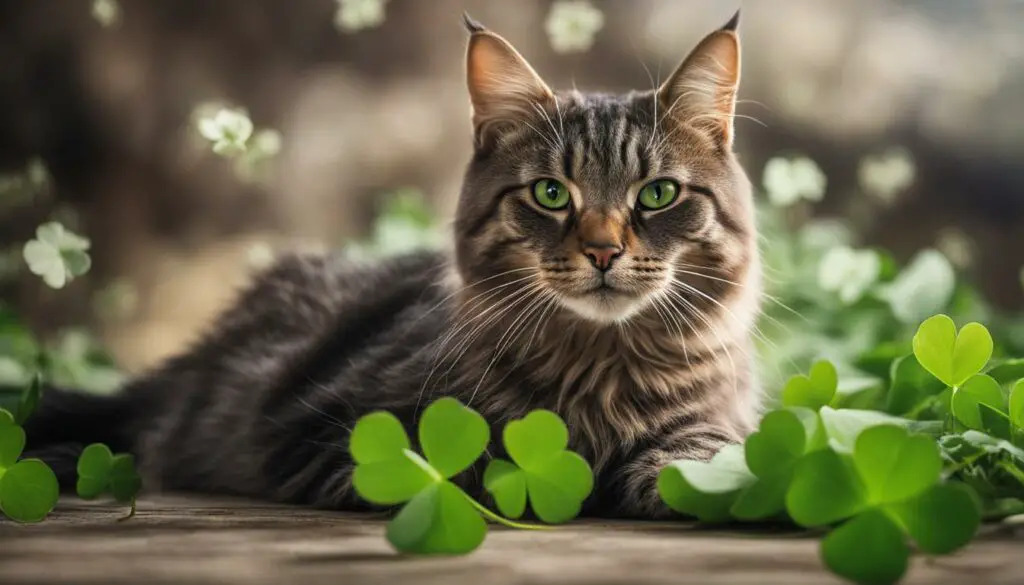
Many people believe that a cat’s whiskers are lucky charms, but there is much more to these delicate hairs than meets the eye. Cat whiskers, also known as “vibrissae,” are highly sensitive tactile hairs that protrude from a cat’s face, chin, and above the eyes.
The significance of cat whiskers lies in their exceptional sensitivity. These vibrissae are deeply rooted in the cat’s skin and are connected to the nervous system, allowing them to detect even the slightest changes in the environment. A cat’s whiskers are so sensitive that they can detect tiny air movements, making them excellent tools for navigation and sensing prey.
Aside from their function, cat whiskers also hold a special symbolism. In many cultures, they are considered a symbol of a cat’s agility, grace, and independence. They are also believed to signify the bond between humans and cats, as they are a unique aspect of feline anatomy that sets them apart from other animals.
The Structure of Cat Whiskers
Cat whiskers are not ordinary hairs. They are thicker, longer, and stiffer than regular hairs, and have a specialized structure that enables them to function as tactile sensors. Each hair is rooted in a specialized hair follicle that is surrounded by blood vessels and nerve fibers. This follicle is cushioned by a capsule of blood-filled cavities, which act as shock absorbers and protect the hair from damage.
The base of a cat whisker is embedded in a highly sensory organ called a “follicle-sinus complex.” This complex is believed to detect the movements of the whisker and send signals to the cat’s brain, allowing it to navigate its surroundings with remarkable precision.
The Role of Cat Whiskers
In addition to their sensory functions, cat whiskers also play a key role in communication. When a cat is excited or agitated, its whiskers will flare out to the sides, indicating its emotional state. Whiskers can also be used to signal aggression or submission, as well as to convey affection.
Moreover, cat whiskers also assist in protecting a cat from injury. When a cat encounters an obstacle, its whiskers will bend back, signaling to the cat to stop or change direction. This mechanism helps prevent cats from getting stuck in tight spaces or injuring themselves while hunting prey.
“A cat has absolute emotional honesty: human beings, for one reason or another, may hide their feelings, but a cat does not.” – Ernest Hemingway
The Origins of the Cat Whisker Superstition
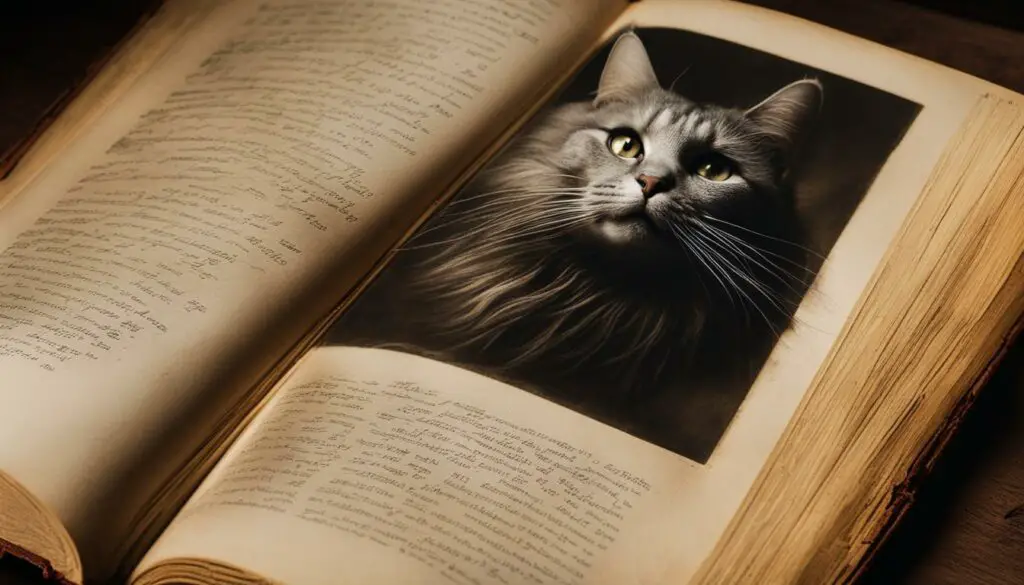
Cat whiskers have been associated with good luck for centuries, and the origins of this superstition can be traced back to ancient folklore. In many cultures, it is believed that finding a stray cat whisker can bring good fortune and prosperity.
One popular belief is that a cat’s whisker can act as a protective charm. In the Middle Ages, people believed that witches could transform themselves into cats and steal a person’s luck. By carrying a cat’s whisker, people believed they could ward off evil and keep their luck safe.
“If you find a whisker from a black cat, put it in a silk bag and carry it with you. It will bring you luck.”
Another theory suggests that cat whiskers were once used in love potions. It was believed that if a woman mixed a cat’s whisker with her lover’s food, they would fall deeply in love and remain faithful.
Over time, the symbolism of cat whiskers expanded to include other forms of luck. For example, finding a cat’s whisker near a river or stream was seen as a sign of great luck in many cultures.
| Culture | Belief |
|---|---|
| Japanese | it is believed that finding a white cat whisker brings good luck |
| Russian | finding a black cat whisker is said to bring good luck and a happy marriage |
| Irish | it is believed that finding a cat’s whisker in the home is a sign of good luck and prosperity |
While the origins of the cat whisker superstition may be steeped in folklore, many people still believe in their luck-bringing abilities. Some cat owners even keep their cat’s whiskers as personal charms and lucky talismans.
Cat Whiskers in Different Cultures

The belief in the luck of finding a cat whisker is not universal. In fact, different cultures have their own customs and beliefs regarding cat whiskers. For example, in Japan, if you find a white cat hair, it is believed to bring good fortune and happiness, while in Europe, finding a cat whisker is said to be a sign of impending rain.
In some cultures, cat whiskers have been used as a form of divination. The Ojibwe tribe in North America believed that the direction in which a found cat whisker curved was a sign of the direction in which they should travel. Meanwhile, some African cultures used cat whiskers in healing rituals.
Interestingly, in many cultures, black cats are believed to bring bad luck, yet finding a black cat’s whisker is considered to be lucky. This contrasts with the Western superstition that black cats are unlucky.
The variations in beliefs about cat whiskers highlight the diverse ways in which different cultures perceive the world around them. It is a testament to the richness of human imagination and the significance that small things, such as a cat whisker, can hold in different people’s lives.
The Science Behind Cat Whiskers
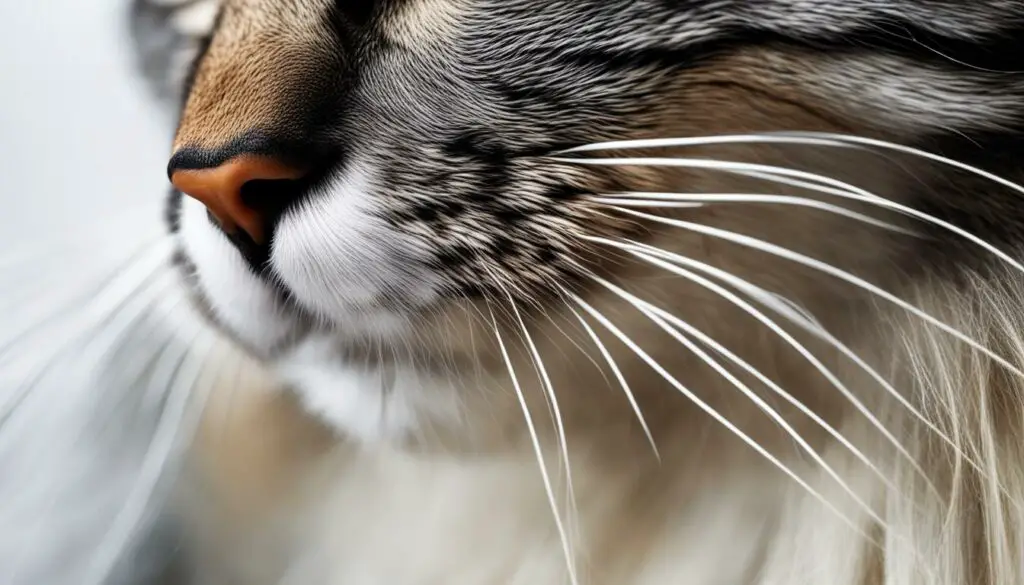
Have you ever wondered why a cat’s whiskers are so long and seemingly delicate? These specialized hairs, also known as vibrissae, have an important role in a cat’s sensory perception and overall well-being.
The structure of a cat’s whisker is different from other hairs on its body. Each whisker is deeply rooted in a hair follicle surrounded by a rich supply of nerves and blood vessels. The base of the whisker is flexible, allowing it to bend and move independently, while the tip contains a small bulb that is highly sensitive to vibrations.
When a cat moves its head, the whiskers are able to detect changes in the surrounding environment, such as the location of objects and movement of prey. This enables cats to navigate their surroundings with great precision, even in complete darkness.
Cat whiskers also play a crucial role in a cat’s emotional state. When a cat is feeling threatened or fearful, it will flatten its whiskers against its face, signaling to others that it is not in the mood for interaction. On the other hand, when a cat is feeling friendly and sociable, its whiskers will be in an upright and forward-facing position.
In summary, cat whiskers are not just a decoration on a cat’s face. They serve a vital purpose in a cat’s survival and well-being, providing sensory input, aiding in navigation, and signaling emotional states. While they may be associated with good luck, the reality is that cat whiskers are much more than just a superstitious symbol.
Cat Whiskers as Personal Charms
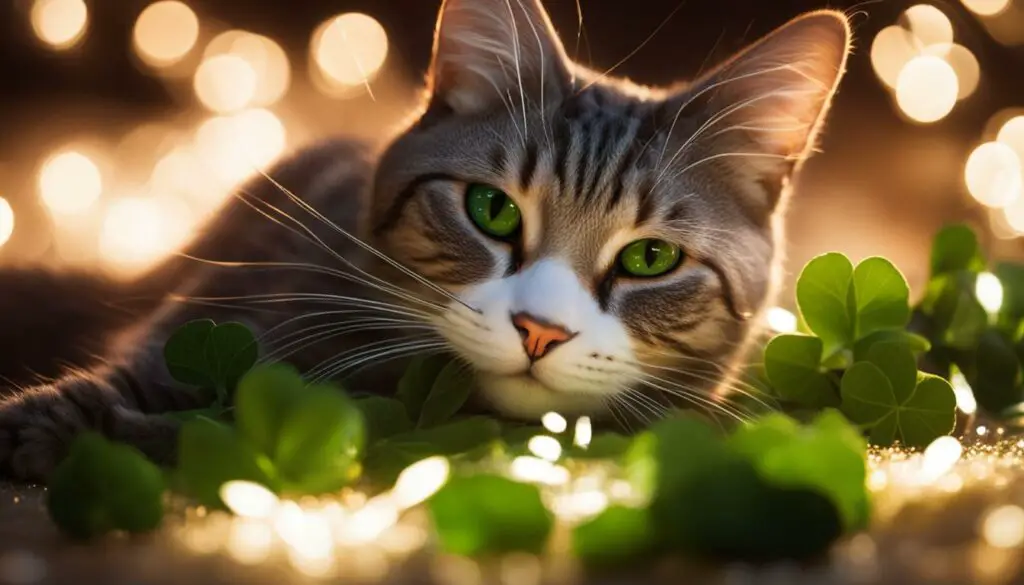
For some, finding a cat whisker is more than just a fascinating discovery; it is believed to bring good luck. In fact, many individuals use cat whiskers as personal charms or talismans.
Some people wear them as jewelry or keep them in their wallets, while others place them in their homes or workplaces to attract positivity and ward off negative energy.
The idea of cat whiskers as lucky charms has been around for centuries and is still prevalent in many cultures today. For those who believe, finding a lucky cat whisker can be a truly magical experience.
| Use of Lucky Cat Whiskers | Belief Behind It |
|---|---|
| Worn as jewelry | Brings good fortune |
| Kept in the wallet | Attracts wealth and abundance |
| Placed at home or workplace | Protects against negative energy and evil spirits |
Whether or not using cat whiskers as personal charms actually brings good luck is up for debate. However, for those who believe in their power, the mere act of carrying or displaying a lucky cat whisker can provide comfort and a sense of security.
The Reality of Finding Cat Whiskers
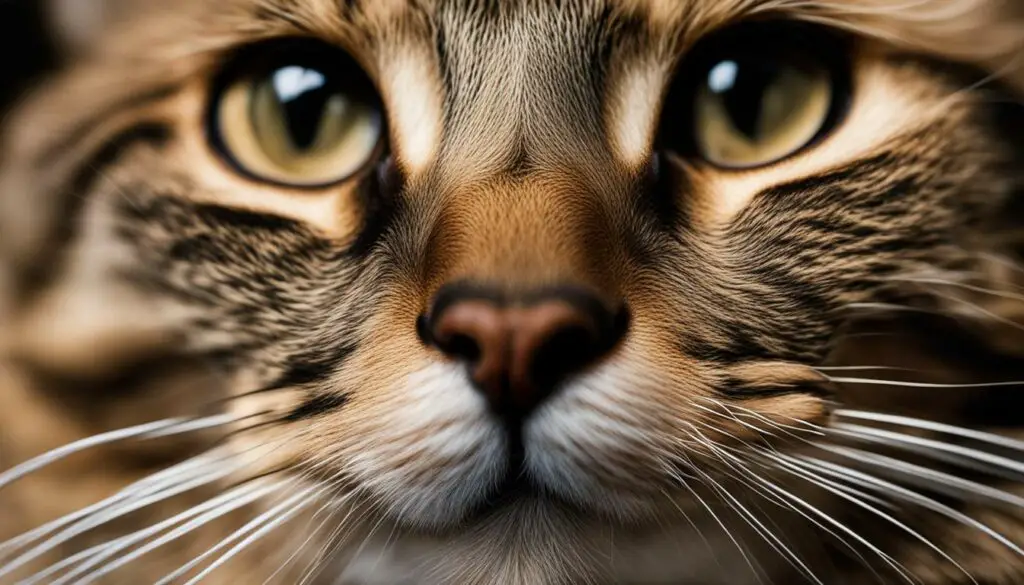
Many cat owners and lovers have come across a cat whisker at some point, whether by chance or by intentionally searching for them. But does finding a cat whisker truly bring good luck?
The answer is not straightforward, as it depends on one’s personal beliefs and superstitions. While some may firmly believe in the auspiciousness of a cat whisker, others may simply view it as a unique biological feature.
There is no scientific evidence to support the idea that finding a cat whisker is a sign of good luck. It’s important to note that many cultures and regions may have their own unique beliefs about cat whiskers, so the significance of finding a whisker may vary from person to person.
However, finding a cat whisker can still be an exciting and intriguing experience. As we discussed in section 5, cat whiskers are remarkable biological structures that play a crucial role in a cat’s sensory perception. They’re also incredibly durable, making them a fascinating find.
So, while finding a cat whisker may not necessarily bring good luck, it can still be a meaningful and curious discovery. As with many superstitions, the true significance of a cat’s whisker may ultimately lie in the eye of the beholder.
Debunking the Myth
While finding a cat whisker may be exciting, the belief that it brings good luck is a superstition that lacks scientific evidence. In fact, this idea is more likely to be a cultural myth, perpetuated through word of mouth or personal experience rather than actual fact.
Historically, cats have been associated with a variety of superstitions, from bringing good fortune to warding off evil spirits. However, there is no concrete evidence linking cat whiskers to any particular kind of luck or charm.
“The idea that finding a cat whisker brings good luck is likely just a cultural myth, perpetuated through word of mouth or personal experience rather than actual fact.”
While it may seem harmless to believe in the luck of a cat whisker, giving it too much credence could lead to disappointment or even a willingness to overlook actual facts. It’s important to remember that good fortune is often the result of hard work and perseverance, rather than the happenstance of finding a stray whisker.
That being said, personal beliefs and superstitions can be powerful influences, and if finding a cat whisker brings you joy or comfort, there’s nothing wrong with holding onto that belief. Just don’t let it overshadow the truth or hinder your ability to achieve your goals.
In conclusion, the belief that finding a cat whisker brings good luck is a popular superstition with no scientific basis. While it may hold personal meaning for some individuals, it’s important to approach it with a critical eye and not let it overshadow reality.
Cat Whiskers and Personal Beliefs
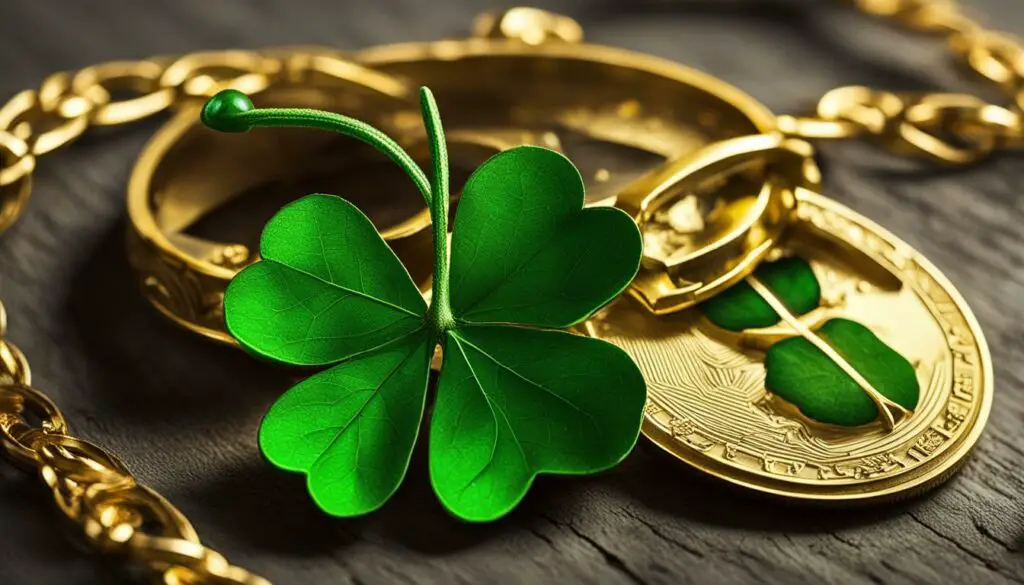
Belief in the luck associated with finding a cat whisker is a personal belief that varies from person to person. Some people believe that finding a cat whisker brings good fortune, while others do not see it that way. It is important to recognize that personal beliefs can shape one’s perception of luck and influence their actions.
For example, some people may keep a found whisker as a personal charm or talisman, believing that it will bring them good luck and protect them from harm. Others may simply discard it or view it as an interesting natural phenomenon.
It is important to respect each person’s individual beliefs and understand that they may not always align with our own. What may seem like superstition to one person may hold great significance to another. Therefore, it is essential to approach the topic of cat whiskers and luck with an open mind and respect for different perspectives.
The Power of Personal Beliefs
Personal beliefs have a powerful impact on our thoughts and emotions. They can shape our perceptions of the world around us and influence our actions. For some, finding a cat whisker may reinforce their belief in luck and provide a sense of comfort. For others, it may have no significant meaning.
“Luck is not chance, it’s toil; fortune’s expensive smile is earned.” – Emily Dickinson
Emily Dickinson’s quote reminds us that luck is not purely based on chance and that our actions have an impact on our outcomes. While finding a cat whisker may bring a sense of luck or comfort, it is ultimately up to us to create our own fortune through hard work and perseverance.
Regardless of personal beliefs, cat whiskers remain a fascinating biological feature that showcase the complexity of feline anatomy. They serve as a symbol of the unique and intriguing aspects of the natural world.
Cat Whiskers as a Fascinating Phenomenon
While much of the discussion around cat whiskers centers on their perceived luck-bringing properties, there is no denying that they are a fascinating biological feature. Not only do they play a crucial role in a cat’s sensory perception, but they also hold a variety of symbolic meanings.
First and foremost, cat whiskers are a sign of a healthy and happy feline. When a cat is content, its whiskers will be relaxed and pointing forward. When it is alert or frightened, the whiskers will be pulled back against the face. This simple but effective communication tool helps cats communicate with both other cats and their human caregivers.
But beyond their practical function, cat whiskers have also taken on a range of cultural and symbolic meanings throughout history. In some cultures, for example, they are associated with good luck and fortune, while in others they are seen as mystical or spiritual objects.
“The cat is the animal to whom the Creator gave the biggest eye, the softest fur, the most supremely delicate nostrils, a mobile ear, an unrivaled paw and a curved claw borrowed from the rose-tree.” – Colette
For some, cat whiskers represent intuition and perception, reminding us to trust our instincts and remain alert to our surroundings. In Japanese culture, the Maneki Neko, or “beckoning cat,” is a popular talisman that often includes a raised paw and a protruding whisker.
Overall, cat whiskers are a fascinating and multifaceted aspect of feline biology and cultural beliefs. Whether you choose to believe in their good luck-bringing properties or simply appreciate them as a unique biological feature, they are undeniably captivating.
Conclusion
This article has explored the popular belief that finding a cat whisker brings good luck, delving into the superstitions, cultural variations, and scientific aspects associated with this folklore. We have examined the significance of cat whiskers in feline anatomy, the origins of the belief, and how it varies across different cultures and regions.
We have also discussed the power of personal beliefs and how they can influence our perceptions of luck, as well as the reality of finding a cat whisker and debunking any unfounded claims.
Regardless of whether you believe in the luck of a cat whisker, they remain a fascinating part of feline anatomy and human imagination. From their structure and growth to their sensitivity and function, cat whiskers hold intriguing symbolism and significance.
Thank you for reading and exploring the world of cat whiskers with us. We hope this article has provided you with a deeper understanding of this captivating phenomenon.
FAQ
Is finding a cat whisker really considered good luck?
While some believe that finding a cat whisker brings good luck, it is ultimately a superstition and not based on factual evidence.
What is the significance of cat whiskers?
Cat whiskers, also known as vibrissae, play a vital role in a cat’s navigation and sensory perception. They are highly sensitive and help cats detect changes in their environment.
Where did the belief in lucky cat whiskers come from?
The belief in lucky cat whiskers can be traced back to ancient folklore and cultural traditions. It has been passed down through generations, ultimately becoming a popular superstition.
How do different cultures view finding cat whiskers?
The belief in lucky cat whiskers varies across different cultures and regions. Some cultures consider finding cat whiskers as a sign of good luck, while others may have different interpretations or beliefs.
What does science say about cat whiskers?
From a scientific standpoint, cat whiskers are an amazing feature of feline anatomy. They serve important purposes in a cat’s life, contributing to their sensory perception and overall functionality.
Can cat whiskers be used as personal charms?
Some individuals believe that carrying or wearing a cat whisker can bring good fortune and protection. However, this belief is based on personal beliefs and not supported by scientific evidence.
Does finding a cat whisker really bring good luck?
The belief in the luck associated with finding a cat whisker is subjective and varies from person to person. There is no scientific evidence to support this claim, and it ultimately comes down to personal beliefs and interpretations.
Are there any alternative explanations for the belief in lucky cat whiskers?
While the belief in lucky cat whiskers is deeply ingrained in some cultures and traditions, alternative explanations could include psychological factors, cultural influences, and personal experiences.
How does personal belief influence the perception of lucky cat whiskers?
Personal beliefs strongly influence how one perceives luck and superstitions. Individual experiences and cultural backgrounds can shape one’s belief in the luck associated with finding a cat whisker.
What makes cat whiskers such a fascinating phenomenon?
Cat whiskers are a unique biological feature that showcases the intricacies of feline anatomy. They not only serve essential functions for cats but also hold symbolic and personal significance for many people.
